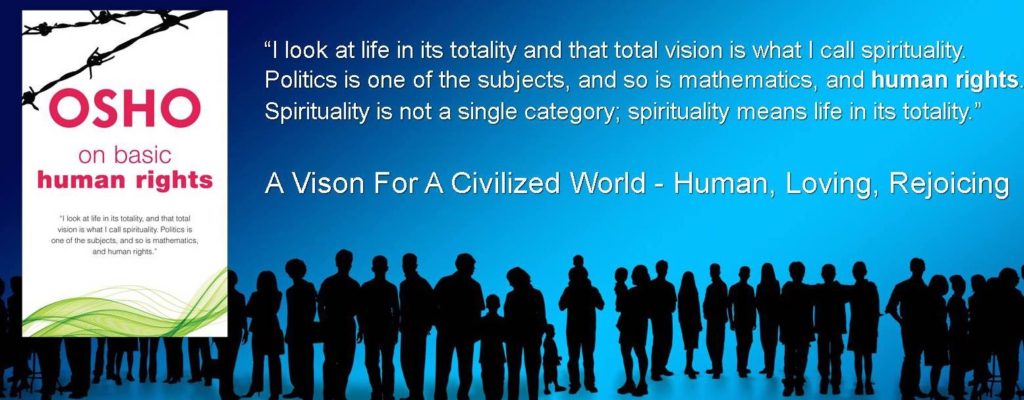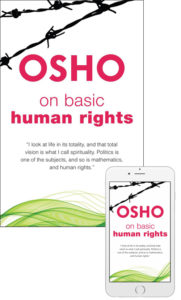A New Narrative

Why is our human reality on this planet so far off from these beautifully worded declarations?
Even Osho’s own audience often has not liked what he says, has been made uncomfortable by some aspects of his often provocative and challenging vision. Some, both at the time these words were spoken and still today, would prefer that he confine himself to spirituality, not get involved in “politics.” They want him just to speak beautiful words on meditation, on nature, and love, and beautiful things we all like. But, as this book makes clear, taking comfort in beautiful words is not the same as living in awareness. It is not waking up. It is not OSHO.
“I look at life in its totality and that total vision is what I call spirituality. Politics is one of the subjects, and so is mathematics, and human rights. Spirituality is not a single category; spirituality means life in its totality.”
“I have threatened all the powers of the world – religious, political, social. A single man, single-handedly has been able to prove the impotency and poverty of all great powers, great theologians, great organized religions. What more reward can I receive? And this is going to help the movement. It means you have got a master, not just a goody-goody saint!”
On Basic Human rights in uitgebreide en herziene versie
In “On Basic Human Rights” geeft Osho aan: “Tenzij we de uniekheid van Iedere mens erkennen, bestaan er geen Rechten van de Mens en zal er geen beschaafde wereld komen – menselijk, liefdevol en vreugdevol. Ik kijk naar het leven in haar  totaliteit en die totale visie is wat ik spiritualiteit noem.” “I have threatened all the powers of the world – religious, political, social…..”
totaliteit en die totale visie is wat ik spiritualiteit noem.” “I have threatened all the powers of the world – religious, political, social…..”
De uitspraak over de Rechten van de Mens zoals die weergegeven zijn in de fraaie verklaring van de Verenigde Naties, was een verworvenheid van de generatie uit de Tweede Wereldoorlog, als gegeven aangenomen door de volgende generatie – een grootse verworvenheid, gegrift in steen en wie zou dit idee niet ondersteunen?
Het was Osho die onze kijk op deze “grootse verworvenheid” ging uitdagen, waarbij hij deze fundamenteel bloot legde als een politieke teleurstelling.
In twee avondtoespraken stelde hij datgene aan de kaak waarvan wij dachten dat het zo juist was, zo onbetwistbaar…maar wat niet door ons begrepen werd. En nu zijn we in 2017: de basis van onze zogenaamde grote verworvenheden wordt opnieuw bedreigd door ontwikkelingen in de politiek en velen beseffen dat evenmin. De wereld verkeert in een fase waarin alle gevestigde modellen – religieuze, politieke, sociale, economische en morele – uiteen vallen. Ze komen aan het licht als wat zij werkelijk zijn – grootse ideeën, maar hol. Niets meer dan ideeën.
On Basic Human rights is verkrijgbaar via de boekhandel.
Impression of On Basic Human Rights
The affirmation of Basic Human Rights as outlined in the great United Nations declaration was an achievement of the World War II generation, taken as a given by the next generation – a great achievement, written in stone, and who would not be in support of this idea??
It was OSHO who challenged our views on this “great achievement,” basically exposing it as a political deception.
deception.
In two evening talks, he challenged what we thought was so right, was so indisputable…. I did not really understand this at the time. And here we are in 2017; the very basics of our so-called great achievements are under threat again by developments in politics, and many of us don’t even realize it. The world is in a phase where all established models – religious, political, social, economic and moral – are falling apart They are being exposed as what they actually are – great ideas, but hollow. Nothing more than ideas.
Why is our human reality on this planet so far off from these beautifully worded declarations?
Even Osho’s own audience often has not liked what he says, has been made uncomfortable by some aspects of his often provocative and challenging vision. Some, both at the time these words were spoken and still today, would prefer that he confine himself to spirituality, not get involved in “politics.” They want him just to speak beautiful words on meditation, on nature, and love, and beautiful things we all like. But, as this book makes clear, taking comfort in beautiful words is not the same as living in awareness. It is not waking up. It is not OSHO.
“I look at life in its totality and that total vision is what I call spirituality. Politics is one of the subjects, and so is mathematics, and human rights. Spirituality is not a single category; spirituality means life in its totality.”
“I have threatened all the powers of the world – religious, political, social. A single man, single-handedly has been able to prove the impotency and poverty of all great powers, great theologians, great organized religions. What more reward can I receive? And this is going to help the movement. It means you have got a master, not just a goody-goody saint!”
Osho asked at the time that his two talks be published as a small book titled “On Basic Human Rights.” Today, we bring these two talks back as part of a new and expanded edition for a new and very engaged audience – a new generation engaged in a real rebellion, a generation with a growing awareness that things have gone very wrong and new, non-political but revolutionary solutions are needed.
When Osho takes on issues of social or political relevance, one can expect to be confronted with something that disturbs and challenges one’s ideas and beliefs, pushing us out of our comfort zone. Along the way, he shares a mystic’s vision of a future with potential that is far beyond what our small political minds can imagine, a future where “human rights” are not just an idea but a living, growing reality.